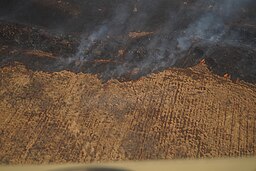It has been a little over a year since a storm water drainage pipe under Duke Energy’s coal ash storage pond in Eden, North Carolina collapsed, allowing 39,000 pounds of coal ash to spill into the Dan River.
Since then, residents of communities along the river, scientists, Duke representatives, state regulators and others have debated about the impact the spill will have on the surrounding communities. But, among the contrasting views and evidence, only one thing is truly clear: no one really understands what kind of impact the spill has had and will have in the following years.
Coy Harville, the Westover District representative on the Pittsylvania County Board of Supervisors, states that the spill has had an impact on the public’s perception of the river in Pittsylvania County in Virginia.
“A lot of people don’t like the coal ash spill, period,” said Harville. “We’ve had the Dan River designated as a scenic river and, well, (the spill) paints a bad picture for the counties (along the river).”
Harville cited from personal experience that the public has become wary of using the river for recreation and for drinking water.
Negating any effects from the spill — even years down the road — may not be possible. The Environmental Protection Agency and state regulators allowed Duke to cease cleanup efforts last year. They decided continuing cleanup may do more harm than good, as dredging could stir up long-settled deposits of industrial waste that once washed into the river during a century’s worth of manufacturing along the Dan.
Guilford Visiting Assistant Professor of Biology Will Mackin argued that Duke should still undergo severe consequences as a result of the spill.
“The CEO should be fired, and they shouldn’t get the $10,000 bonuses that they get (each year if the company meets or exceeds their expected profits),” said Mackin. “There is not really an excuse (for the spill) except laziness and inefficiency.”
While Duke has spent nearly $20 million responding to the spill, it is still undergoing a legal National Resource Damage Assessment process for its violations of the Eden pond site and 14 others ranging across North Carolina. Currently, it is clear not much else can be done to alleviate potential effects of the spill.
Yet, there is positive change that has resulted from this event.
“(The spill) has definitely prompted new legislation in North Carolina,” said Assistant Professor of Geology Holly Peterson. “That’s really the big benefit of it.”
The new legislation she refers to now prohibits the creation of any new coal ash ponds and requires Duke to eliminate the remaining 14 coal ash ponds in North Carolina over the next 15 years.
In addition, the EPA has called for closer and more comprehensive inspections of the remaining ponds and of any pipes that run under or beside them. This is to see, especially, if the pipes are made of corrugated metal, a material that is prone to rust and collapse.
The section of the pipe that collapsed under the Eden Pond was made of this material. A Feb. 1 News & Observer article, “A Lack of Oversight Let Flaws, Mistakes Go Undetected,” states that an accidental false report, made by an engineer on the pond in the 1990s, led Duke to believe that the entire pipe was made of reinforced concrete, which is a stronger material than corrugated metal.
It is a combination of flukes in inspection, such as this one, which led to the spill a year ago and, consequently, to the legislation that will hopefully implement strict enough regulation to prevent further spills.
This event served as a warning against potentially more disastrous spills from the other, larger coal ash ponds in need of more thorough inspection and maintenance. Hopefully, the legislation will allow for a positive, preventative approach towards other ponds and will become the most influential effect of last year’s spill.












